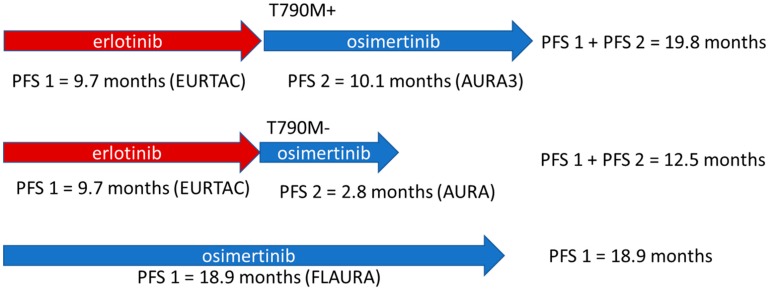Figure 1.
Theoretical comparison of the overall duration of response with two different sequencing paradigms. Pictured above is the sequencing strategy in which an earlier-generation EGFR TKI, erlotinib, is used in the first line, followed by the later-generation EGFR TKI osimertinib after progression in the setting of acquired T790M mutation. Progression-free survival (PFS) for first-line erlotinib is drawn from the phase 3 EURTAC trial, which compared erlotinib to conventional chemotherapy in the first-line setting [15]. The median PFS for osimertinib after progression on early-generation EGFR TKIs in T790M-positive patients was derived from the AURA3 trial [55]. The median PFS for osimertinib after progression on EGFR TKIs in T790M-negative patients was derived from the AURA trial [60]. Pictured below is the sequencing strategy in which the later-generation TKI was used in as a first-line treatment based on the PFS demonstrated in the FLAURA trial [29]. In this comparison, sequential therapy with the earlier-generation EGFR TKI followed by the later-generation TKI after progression with T790M-positivity yielded a greater overall duration of response than the use of later-generation EGFR TKI as the first-line treatment. Fully acknowledging the limitations of the cross-trial comparison, this nonetheless illustrates that the superior efficacy of later-generation therapies in the front line may not lead to superior overall survival despite a clearly superior PFS when comparing front-line therapies in isolation.

